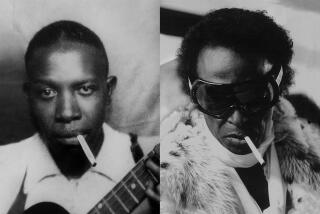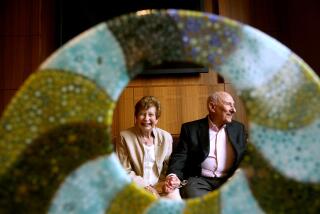Grant Recipients Look Forward to a Year of Research
Whether analyzing plate tectonics, chasing the lives of Elizabethan-era midwives or probing land treaties of American history, 31 Californian scholars and artists will be delving into a year of research, writing and creating, thanks to the John Simon Guggenheim Foundation.
The Guggenheim’s annual fellowships are among the most coveted in academia. And why not? Mid-career professors and artists receive $37,362 on average to pursue all sorts of interests.
Unlike some grants, the Guggenheim is not policed and has few strings attached. At the end, winners usually submit a statement about what they did, but even that is not required.
When she received her acceptance letter recently, history professor Deborah Harkness said, “I was on the verge of hyperventilation. It’s the kind of fellowship you hear about, but you never imagine applying for it and getting it.”
Harkness is one of 185 chosen nationwide from 3,268 applicants this year.
The foundation was founded in 1925 by former Colorado U.S. Sen. Simon Guggenheim and his wife, Olga Hirsch Guggenheim, in memory of a son who died young. The couple, from a wealthy industrialist family, had no heirs.
Here are details of what four Californians will be doing with their grants:
UCLA law professor Stuart Banner will be working on a book on how Native Americans lost their land to Europeans. Banner said he continued to come across conflicting historical accounts: one in which Europeans conquered land from the natives outright, and another version in which signed legal documents showed that Europeans bought the land from the natives.
“It seemed hard to reconcile those two,” Banner said. So he decided to find out what really happened.
Both versions are true, Banner discovered. There are legal documents showing agreements between the natives and Europeans. And transactions between the two were fair in earlier years when the natives far outnumbered the settlers, Banner said.
But “as whites grew more powerful,” he said, “they were able to manipulate the transactions.” The documents have been the basis for successful lawsuits by Native Americans, he added.
Banner is taking a leave from teaching but will work from his UCLA office. Without the time off, Banner said, the book would have taken several years to complete. He hopes to have it finished by the end of the fellowship.
Harkness spent years and traveled miles to dig through British and American archives in the name of the history of science. With the fellowship, she can take a leave from teaching and sift through the 1,700 characters -- midwives, apothecaries and bone-setters included -- she discovered and weave their stories into a book to recreate the scientific community of Elizabethan London.
Harkness, who has taught history at UC Davis for seven years, also received an academic year fellowship to the National Humanities Center in North Carolina, which she will begin in September. She will start a new professorial post at USC in fall 2005.
As she researched her first book, on Queen Elizabeth’s court astrologer, Harkness started to see an expansive but largely undocumented scientific community of the 16th century that she hadn’t known anything about. So she started to dig.
“It was really an attempt to reconstitute this world from the ground up from the streets of London,” Harkness said. She made about 10 trips to England, where she searched through public records and archives.
“You uncover the name of a midwife and then you think, can I find anything more about her?” Harkness said. “And you find out she was a witness to an illegitimate birth, or you find her in another archive. It became a kind of investigative trail where you were following these individuals.”
Harkness hopes her work will highlight the contributions of ordinary people.
“We always think of the big guys,” Harkness said. “But where would Copernicus be without people to talk to about his discoveries?”
While Harkness and Banner are looking into the past, Alexandra Jaffe will be looking at contemporary issues.
Jaffe, a Cal State Long Beach linguistics professor, plans to write a book on bilingual schools on Corsica, a Mediterranean island that has been a part of France since 1768. It had earlier been ruled by Italy.
French became the dominant language in the 20th century, and Corsican, a language close to Italian, lost value. In 1996, however, French law brought Corsican back into the classroom as a second language.
Jaffe relates what is going on in the Corsican classroom to a wider social context.
“The link of language and nationhood ... is a very powerful ideology, and that’s had an effect on language policy in the schools,” Jaffe said.
In 1999, Jaffe wrote a book on Corsican-language politics in which she looked at social examples such as road signs and Corsican-language newscasts. Her next book will be based on research she did in 2000, but Jaffe plans to travel to Corsica next month and again next year.
Caltech professor Joann Stock is headed to study the Sea of Japan for six months and compare it to the Gulf of California.
Stock hopes to understand how the similar two bodies of water behave. By examining Japanese studies, Stock hopes to understand what may happen to the Gulf of California and whether it will stop stretching, as the Sea of Japan did.
If Baja California keeps moving northwest, stretching away from the continent -- it moves less than 2 inches a year -- a new ocean could be formed.
“If you look at the pattern of faulting that happened when the Sea of Japan was opening,” Stock said, “it might have looked the same 20 million years ago as what the Gulf of California looks like now.”
The goal of the project is to better understand how oceans result from the stretching of continental plates. Stock will collaborate with scientists from the University of Tokyo and later with scientists from the University of Sonora, in Mexico, where she will spend five months.
Without the support of the Guggenheim foundation, Stock said, “I probably wouldn’t be able to do this project at all.”
More to Read
Sign up for our Book Club newsletter
Get the latest news, events and more from the Los Angeles Times Book Club, and help us get L.A. reading and talking.
You may occasionally receive promotional content from the Los Angeles Times.







